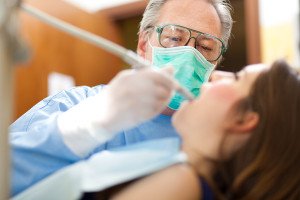Oral Surgery Post-Operative Recovery Guidelines
 Once an oral surgery procedure has been completed at Community Dental Group, the focus shifts to recovery and the patient healing as quickly as possible. Your dentist will provide you with some post-operative recovery instructions to ensure that there is no risk of infection or surgical site trauma. The following guidelines are provided to every oral surgery patient in the hopes that the recovery period proceeds as pain-free and smoothly as possible.
Once an oral surgery procedure has been completed at Community Dental Group, the focus shifts to recovery and the patient healing as quickly as possible. Your dentist will provide you with some post-operative recovery instructions to ensure that there is no risk of infection or surgical site trauma. The following guidelines are provided to every oral surgery patient in the hopes that the recovery period proceeds as pain-free and smoothly as possible.
Post-extraction bleeding – after a tooth has been extracted, the presence of some bleeding for up to 24 hours is not uncommon. Your dentist will provide you with gauze and will instruct you to bite down firmly for an hour or so after your tooth has been extracted. When you remove the gauze, do so gently and slowly. If the gauze feels like it is sticking, a sip or two of water will usually help to loosen it so it can be removed without more bleeding occurring.
Post-operative pain – again, like swelling (see below), the amount of pain you experience after an oral procedure is going to depend on the extent of your surgery. In most cases, your dentist is going to prescribe a mile pain killer to help you manage any discomfort you may be experiencing. Be sure that you consult with your dentist prior to taking your medication and be sure that you follow the dosage instructions to the letter.
Recovery and rest – you want to get plenty of rest the first 48 hours and avoid any physical activity up to 3 days afterwards. After that, there shouldn’t be a problem resuming any of your normal daily tasks and activities.
Swelling – most oral surgery procedures involve some swelling during the post-operative period and recovery period. We typically recommend keeping your head elevated and using ice packs to ease the swelling. Depending on the extent of the surgery, the swelling could last up to 10 days. Additionally, you may experience some stiffness in the facial muscles for up to 10 days.
Tobacco usage – smoking is prohibited for 24 hours after your surgery because it will inhibit the healing process and could cause a serious infection such as a dry socket. You should also avoid chewing tobacco and any smokeless varieties as this can also cause infection as well as a great deal of pain and discomfort.
In addition to the above, your Community Dental Group dentist or oral surgeon will also provide oral hygiene instructions. Be sure to follow these as closely as possible.